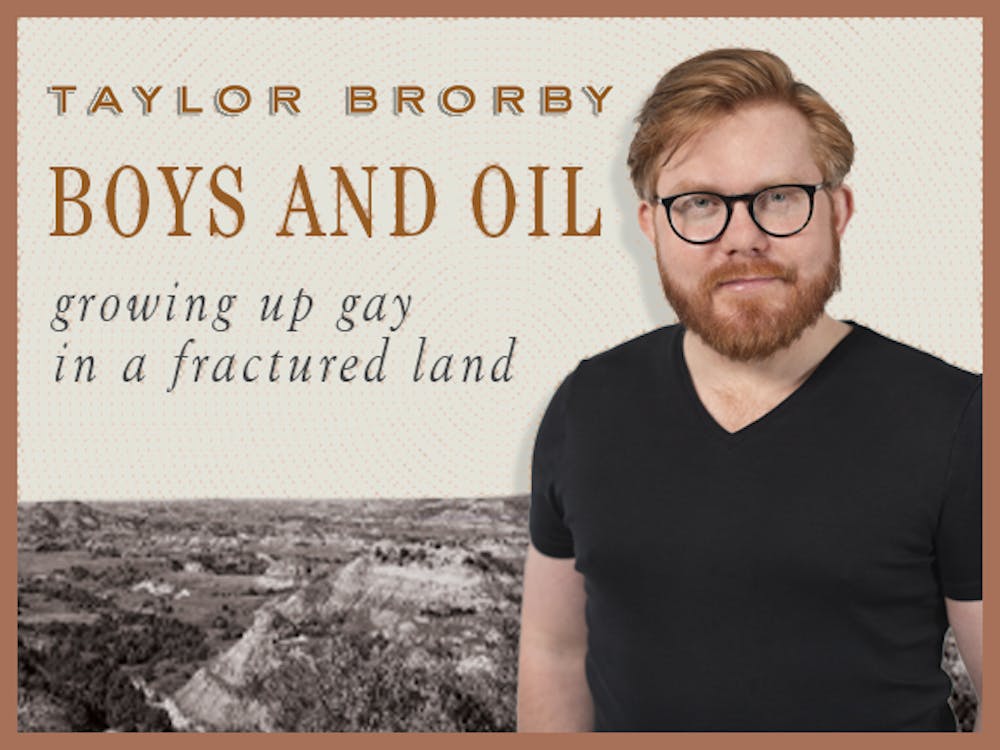Taylor Brorby always felt trapped growing up gay in Center, North Dakota. He looked to the vastness and vibrance of Center’s hilly plains for solace — only for mining and fracking to fracture whatever comfort he had left in that town.
The 35-year-old writer, environmentalist and University of Utah instructor will visit the UF Smathers Library Tuesday at 7 p.m. to talk about his 2022 memoir, “Boys and Oil: Growing Up Gay in a Fractured Land,” which explores issues regarding queerness, the environment and extractive economies through his own experiences.
The memoir follows what it was like for Brorby to come to terms with his sexuality and see the environment around him be drained of its vitality in a small, conservative town that revolved around the American coal industry.
“Even though people would call it God’s country when I was growing up,” Brorby said, “they made their money by destroying it.”
Jack Davis, a 66-year-old UF history professor, said he and environmental journalist Cynthia Barnett invited Brorby because the writer is closer in age to UF students than other public speakers who have visited. Brorby has also grown up during significant cultural and environmental changes with which college students can identify, Davis said.
Students will learn about a new perspective not often talked about in American literature at the author’s talk, Davis said.
Davis is the Rothman Family Chair in the Humanities, where he oversees a fund that provides visiting lectures like Brorby's.
Luke Rodewald, a 30-year-old fourth-year English graduate student, also co-organized the visit with Davis and Barnett. He knew Brorby from their time as graduate students at Iowa State University, he said.
Brorby’s work is important for students in this period of legislative developments in Florida that put queer people at risk, Rodewald said.
Gov. Ron DeSantis announced his plans to defund diversity, equity and inclusion programs at Florida universities Jan. 31. He also backed his administration’s ban on the Advanced Placement African American Studies course Jan. 23, nearly a year after the Florida legislature signed the Parental Rights in Education — or “Don’t Say Gay” — bill into law.
“[Brorby’s] story is a way of centering those voices that are being silenced and a way of announcing that they’re here,” Rodewald said. “And they’re here to stay.”
In “Boys and Oil,” Brorby parallels the trauma inflicted on him by his peers for being gay with the trauma inflicted on his homeland — such as air pollution, water contamination and oil spills — by coal industry operations.
Brorby’s memoir reinforced the intersections of LGBTQ issues and environmental justice, Rodewald said, by showing how the same logic that leads to environmental ruin is interlinked with hatred toward queer people.
DeSantis said the banned AP course violated House Bill 7, or Stop W.O.K.E. Act, for its discussion of queer theory and intersectionality, two prominent aspects of the North Dakotan author’s work.
People may have their own positions, Brorby said, but students should be able to learn anything without regulation and apply that knowledge however they want.
This rhetoric following DeSantis and his administration’s proposals focuses on the issue of indoctrination, Davis said, which Davis believes is something UF doesn’t do.
“It’s inspiring our students to be lifelong learners,” he said. “I’m proud to be guilty of that.”
Brorby wrote his memoir with hopes that he can reach out to people like him who’ve felt alone, he said. He once received an email from a man now in his 80s who read the book and came out in his early 70s.
“‘He said, ‘Oh, Taylor, reading your book, there were so many moments where I thought — if only I had come out sooner,’” Brorby said. “Just heartbreaking.”
The American Midwest is a place to which no one pays attention, Rodewald said, and it’s important to show how hostile overlooked spaces like North Dakota can be toward queer people.
Brorby’s talk, which is free and open to the public, includes discussing rural America in a way that anyone can relate to, he said, and will largely cover topics like sexuality, environment and class.
“If speaking from that space empowers people to feel less scared and less alone and more fired up,” Brorby said, “that’s what I’m hoping to bring — a little fire to the University of Florida.”
Contact Zarin Ismail at zismail@alligator.org. Follow her on Twitter @zarintismail.
Zarin Ismail is a second-year journalism major and a staff writer for the Avenue. She has previously worked as a copy editor for The Alligator. She's also a writer for Strike Magazine. When she’s not writing, Zarin watches international TV shows, shops at thrift stores and plays with her two cats.






